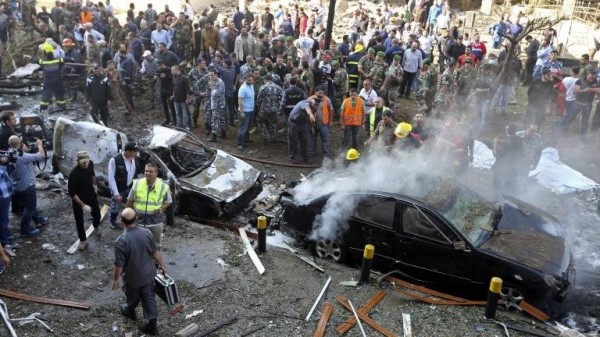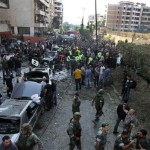
BBC Arabic's Carine Torbey: "The scale of the damage is huge"
At least 22 people have been killed and more than 140 injured in a double suicide bombing outside the Iranian embassy in the Lebanese capital Beirut.
There are conflicting reports as to whether the Iranian cultural attache survived the attack.
Iran is a major backer of the Lebanese Shia militant group Hezbollah, which has sent fighters to Syria to back the government of Bashar al-Assad.
A jihadist group linked to al-Qaeda said it carried out the attack.
Lebanese officials said the first suicide attacker was on a motorcycle, while the second was in a four-wheel drive vehicle.
The head of the Abdullah Azzam Brigades described it as a “double martyrdom operation carried out by two heroes from the heroic Sunnis of Lebanon”.
The Syrian conflict has increased sectarian tensions in Lebanon.
Lebanese Sunni Muslim fighters have joined forces with the mainly Sunni rebels in Syria. Some of the rebel groups are affiliated with al-Qaeda.
Shia Muslim Iran is a major backer of Hezbollah, as well as Mr Assad’s government.
Mr Assad comes from the Alawite sect, a heterodox offshoot of Shia Islam.
Burning cars
TV images showed burning cars, bodies on the street and damaged buildings.
The Iranian ambassador to Beirut had earlier confirmed cultural attache Ebrahim Ansari’s death to Hezbollah’s al-Manar TV, saying it was not clear if he had been in the embassy itself or one of the residential buildings nearby.
However, the Iranian foreign ministry now says he is alive.
Mr Ansari had only taken up his post a month ago.
Carine Torbey, from BBC Arabic, says a suicide attack would be a major escalation.
Our correspondent, who is at the scene, says security forces are still trying to rescue anyone who may be trapped in the rubble, while Hezbollah fighters are searching everyone who wants to enter the area.
Reuters quotes Lebanese officials as saying CCTV footage showed a man rushing towards the outer wall of the Iranian embassy before blowing himself up, causing the first blast.
The Iranian ambassador blamed Israel for the attack – an accusation Israel swiftly rejected.
Israel played “no part”, said Tzachi Hanegbi, a member of the foreign affairs and defence committee in the Israeli parliament, adding: “Of course Israel had nothing to do with such attacks in the past.”
Syria condemned the explosion.
UK Foreign Secretary William Hague also denounced the attack, saying: “The UK is strongly committed to supporting stability in Lebanon and seeing those responsible for this attack brought to justice.”
Iran and Lebanon will play a football match in Beirut as scheduled on Tuesday afternoon, but without spectators, Lebanese media report.
South Beirut, including the area around the Iranian embassy, is considered a Hezbollah stronghold. It has been hit by several attacks in recent months.
Caretaker Prime Minister Najib Mikati called the attack “a cowardly terrorist act”, Lebanese state news agency NNA reported.
“The aim of the blast is to stir up the situation in Lebanon and use the Lebanese arena to convey messages,” he said.
Our correspondent says those responsible wanted to send a clear message to Iran and Hezbollah.
Tehran and the Shia militant group are key backers of the Syrian government, which is currently trying to cut off one of the Syrian rebels’ last remaining supply routes across the Lebanese border.
On 15 August, 27 people were killed in a car bomb in south Beirut believed to have been targeting a Sunni Muslim cleric opposed to Hezbollah. The cleric was unhurt.
Hezbollah fighters were instrumental in a strategic victory by Syrian government forces in Qusair, close to the border with Lebanon, in early June.

People gathered at the scene of the two blasts near the Iranian embassy in the neighbourhood of Janah, a Hezbollah stronghold

People gathered at the scene of the two blasts near the Iranian embassy in the neighbourhood of Janah, a Hezbollah stronghold

Syria crisis spills into Lebanon
- May 2012: Fighting between pro- and anti-Assad groups in Lebanese Tripoli and Beirut leave many dead
- August 2012: Deadly sectarian clashes break out in Tripoli
- October 2012: Several people killed in gunfights after the assassination of top security official General Wissam al-Hassan, a Sunni opponent of Damascus
- May 2013: At least 15 people die in another round of sectarian violence in Tripoli
- June 2013: At least 17 soldiers killed in clashes with supporters of radical Sunni cleric Sheikh Ahmad al-Assir in the southern city of Sidon
- 9 July 2013: A car bomb wounds dozens in a Hezbollah stronghold in Beirut
- 15 August 2013: A car bomb kills 27 people and injures hundreds more in a Shia area of south Beirut
- 23 August 2013: More than 40 people killed and 400 injured in two blasts outside mosques in Tripoli




Leave a reply